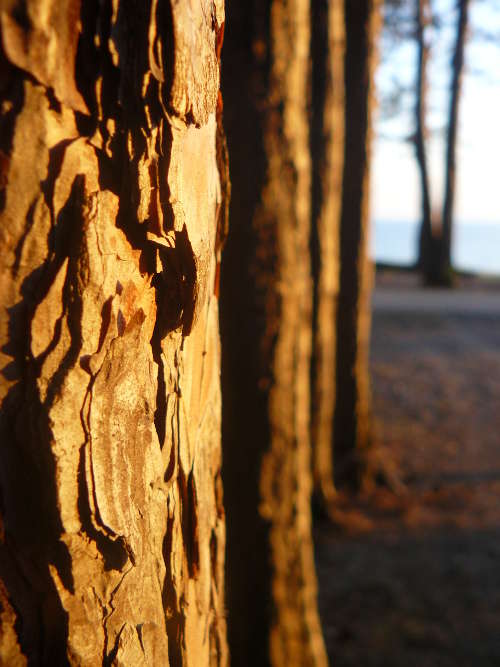 Location Taken: Agawa Bay, Lake Superior Provincial Park, Ontario
Location Taken: Agawa Bay, Lake Superior Provincial Park, Ontario
Time Taken: June 2010
I should write a long post about this, but well, who can say much about bark? I mean, it’s bark! Tree covering!
A rather unusual tree covering, mind you. I’m not entirely certain what type of tree it is, aside from “coniferous” and “grows along Lake Superior”. There’s a lot of trees that match that pair of descriptions.
I checked the bark patterns of cedar and jack pines, both of which are similar and match those descriptions. But neither is a close enough match, alas. So it’s “generic pine tree” to me.
Or perhaps “campground pine tree”. I’ve seen this bark pattern before, at various campgrounds I’ve stayed at over the years. It seems to be one that is well behaved and pretty enough for those who set up the campgrounds to decide not to chop down. Either that or it grows fast on marginal soil and claims the spots between the camp sites. Tough to tell which came first and all, since these trees do grow fast.
It’s an interesting bark, if you look at it. It’s obviously designed to slough off if damaged, with many layers of thin weak bark rather than one thick layer of sturdy bark like you see on many trees. Both patterns have their benefits, mind you. The weak bark means that you have fewer expenditures for repair because the damaged aspects fall off, but the solid bark means fewer things damage you in the first place. The weaker bark also probably deals with being forced outward by the tree’s growth better than the solid bark, since it’s designed to be able to crack as needed. That’s probably why you see weaker layered barks on fast growing pine trees and hard solid bark on slow growing deciduous trees.
This sort of bark also makes excellent mulch for gardens, which is where I’ve seen the vast majority of this stuff. It naturally forms small pieces of water, weed, and rot resistant organic matter, after all. I wonder if they even have to cut down the trees to harvest it, given how it just falls off the trees anyway. Mind you, they probably do chop down the trees anyway, in order to get the wood, and the bark mulch is just a side product.
Huh, I guess I’m one of those who can say much about bark after all.
